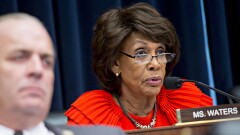WASHINGTON — After a banner year that included the passage of a significant regulatory relief package easing portions of the Dodd-Frank Act, the banking industry is now likely facing a period of legislative gridlock in 2019.
Although Republicans maintained control of the Senate in the November midterm elections, Democrats won the House, setting the stage for political clashes ahead.
“Broadly … I don’t think this is going to be a year marked by legislative agreement," said Ian Katz, a director at Capital Alpha Partners. “I think it’s going to be a year marked by the differences between the two parties.”
Rep. Maxine Waters, D-Calif., the current ranking member of the House Financial Services Committee who will now chair the panel, strongly opposed the reg relief legislation, and she has sparred with Republicans over bills that help Wall Street and limit consumer protection. On the Senate side, Banking Committee Chairman Mike Crapo, R-Idaho, is expected to continue to hold the gavel.
What will likely result is heated rhetoric from Democrats in the House and negative headlines for the firms in their crosshairs. That may include companies like Equifax and Wells Fargo that have already been under a political microscope. Additional investigations by House Democrats are expected to focus on Deutsche Bank and Citigroup and their ties to the Trump family.
“I am committed to strong oversight and following the Trump money trail, starting with Deutsche Bank and suspicious activity reports (SARs) filed with the Financial Crimes Enforcement Network, or FinCEN,” Waters said in a memo to her caucus after the November midterm elections.
Republicans, meanwhile, are expected to push back and argue that banks have been hampered by burdensome regulations and need additional relief to better serve their customers.
Lawmakers also face a smaller window for legislation with the looming 2020 elections. Several outspoken members of the Senate Banking Committee, including Sens. Sherrod Brown, D-Ohio, the panel's ranking member, and Elizabeth Warren, D-Mass., are said to be considering White House bids, which could also limit their focus on banking issues.
“Going into a presidential election year, the window for advancing legislation has historically been narrow,” said James Ballentine, executive vice president for political affairs and congressional relations at the American Bankers Association. “We are hopeful that the banking committees will be able to fully debate and advance issues this year.”
Still, despite these challenges, the banking debate on the Hill is unlikely to grind to a halt, and there remain several core areas of focus that will be front and center in the term to come.
Below is a look at some of the top financial issues that are likely to be on the agenda.










